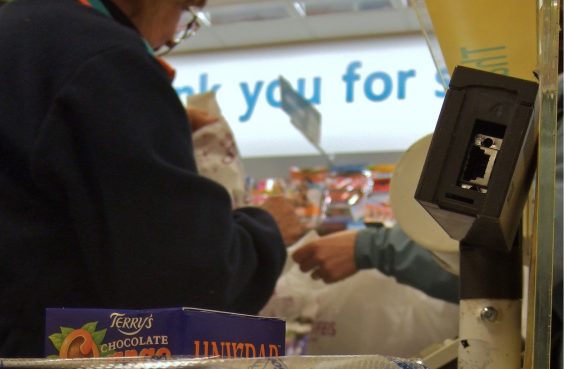
Some who misuse coupons are quick to justify their actions by saying that they’re not doing it out of greed, because they donate many of their items to charity. It may not seem like a convincing argument. But could it be that coupon fraudsters really are as charitable as they claim to be?
A new study suggests they just might be.
A team of researchers came to this conclusion while examining a separate phenomenon – stores that ask you to donate to charity when you’re checking out. Their working paper, entitled “Would You Like to Donate Today? Why Charity at Checkout May Backfire,” found that asking customers to help support a cause may do stores more harm than good.
Unless, that is, coupon abusers are the ones being asked to donate.
But let’s start at the beginning. Picture yourself checking out at the grocery store, ready to pay, when your cashier asks if you’d like to hand over a little more cash for a cause. Are you pleased with your store’s benevolence – or are you a little put off by the request?
“By sponsoring charity at checkout, retailers specifically hope to glean benefits associated with being viewed as socially responsible,” the study reads. But those noble efforts can backfire, because “charity at checkout violates customers’ perceptions of reciprocity in their social contracts with retailers.”
In other words, customers tend to view a retail transaction as an equal exchange. Your store gives you groceries, you give the store cash, and you both come away satisfied. Ideally, “both parties should equally contribute to and benefit from the exchange,” the researchers argue. But “charity at checkout violates this principle by asking customers to incur disproportionate costs and as a result may create disequilibrium in the relationship.”
In a number of simulated retail transactions, research participants who were asked to donate when checking out “exhibited lower satisfaction with the grocery store than those who were not asked to donate.”
But here’s where it gets interesting. Some research participants were given an expired coupon to use when checking out. They knew the coupon was invalid, but used it anyway, and the cashier accepted it.
And then they were asked to donate a little something to charity.
These customers knew “they had violated their social contract with the grocery store,” the study notes. They apparently felt a little guilty, or knew they had gained the upper hand in the transaction. So they were more agreeable to the request for a donation than other customers were.
“A social contract violation by customers can return the exchange relationship to equilibrium,” the researchers conclude. “Customers no longer punish retailers when they have also violated the social contract.”
So it seems coupon fraudsters are more willing to donate to charity at the checkout, and less put off by being asked to donate, than other customers.
But it can work the other way around, too. Stores that ask for donations may make customers feel that they got the short end of the deal. So customers may decide to do something about it – perhaps by misusing coupons in the future to make up for the imbalance.
“Because reciprocity underlies exchanges, customers respond to retailers’ contractual violations by adopting sub-optimal behaviors of their own,” the researchers warn.
According to the organization Engage for Good’s most recent biannual study on charity at the checkout, the country’s largest retailers raised more than $486 million for various charities in 2018 by asking customers to donate money while checking out. In total, the group says these programs have raised more than $5.3 billion over three decades.
As a result, retailers’ charitable giving is unlikely to end any time soon. But in order to preserve these retailers’ relationships with customers, they might try alternative methods of helping out their favored charities. “Retailers should consider corporate donations, cooperative sales promotions, and other activities that have been shown to create positive sentiment,” the researchers suggest. Or retailers could offer a little something of value in exchange for a donation, such as a reusable bag, which “can reestablish equilibrium in the exchange.”
So unless they want to rely on coupon fraudsters to support their favorite causes – or risk creating a bunch of new coupon fraudsters who feel they deserve a little something in return for their donations – retailers who ask for donations at the checkout might reconsider their strategies. The bottom line? “For retailers,” the researchers conclude, “doing good does not always lead to doing better.”
Image source: alisdair














Pingback: Is The $200 Target Gift Card Offer A Hoax? – Deceptology